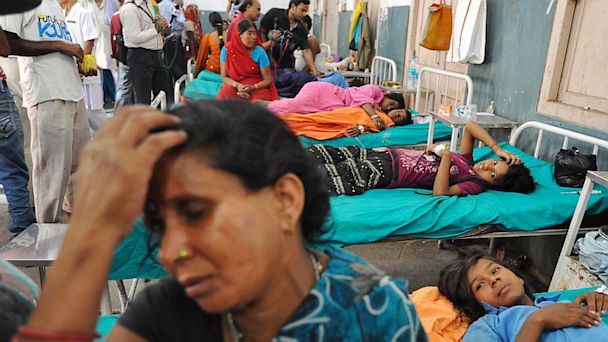Child Deaths in India Put Spotlight on Pesticides
The deaths of 23 Indian children from what authorities are calling pesticide-tainted school lunches have raised questions about insect-killing chemicals used overseas and at home.
The children died after eating a free meal of rice, potatoes and soy thought to contain an organophosphate insecticide, according to Amarjeet Sinha, an official involved with the ongoing investigation. But U.S. experts say the deaths, which came within hours of the children fainting while eating, aren't typical of organophosphate poisoning.
"They don't appear to have had the classic clinical symptoms," said Dr. Donna Seger, executive director of the Tennessee Poison Center and a professor of clinical emergency medicine at Vanderbilt University. "Insecticides usually don't cause sudden fainting and death… I think we need way more information to know how this happened."
Read the reaction from the school cooks.
Investigators found a container of pesticide in the school's cooking area, according to The Associated Press, and said the rice might have been tainted and improperly washed. A cook said oil used to prepare the meal looked unusual, but that she was told by the principal to use it anyway.
The principal fled the school when the children became sick, the AP reported.
A laboratory is expected to release results Friday from forensic tests on the children, their meals and the uncooked grain that was stored in the school principal's house.
Organophosphates are used widely around the world and are the most common pesticide in the U.S., with an estimated 73 million pounds of the chemical sprayed on American crops in 2001, according to the National Centers for Disease Control and Prevention.
Dialkyl phosphate, a metabolite of the pesticides, is present in the urine of adults and children across the country, according to CDC studies. But the U.S. Food and Drug Administration, the Environmental Protection Agency and the Department of Agriculture are jointly responsible for ensuring that foods are free from pesticide levels that pose a danger to human health.
To remove any lingering pesticide residue, the FDA recommends:
- Washing produce with water, not soap, and even scrubbing with a brush;
- Throwing away the outer leaves of leafy vegetables like lettuce and cabbage;
- Trimming the fat from meat and the skin from poultry and fish, since some pesticide residues concentrate in fat and skin.
Beyond causing nausea and vomiting, high levels of organophosphates can slow the heart rate and make it difficult to breathe, according to the National Institutes of Health. Blue lips and fingernails are also common symptoms of organophosphate poisoning, and Seger noted that the chemical often causes the lungs to fill up with fluid, which pours out the mouth.
"I'm not convinced that it was organophosphate poisoning [in India]… It usually doesn't present with sudden fainting and death," Seger said, noting that organophosphates are sometimes used in suicide attempts in the U.S. "Maybe it was some insecticide we don't have here."
There is an antidote for organophosphate poisoning, and patients who show signs of recovery within six hours after treatment tend to do well long term, according to the NIH. The students and cooks who were sickened but survived the poisoning in India - roughly 24 people - are unlikely to suffer from any serious aftereffects, a hospital spokesman told The AP.

Investigators are eyeing pesticide in the deaths of 23 children. (Image credit: Krishna Murari Kishan/Reuters)